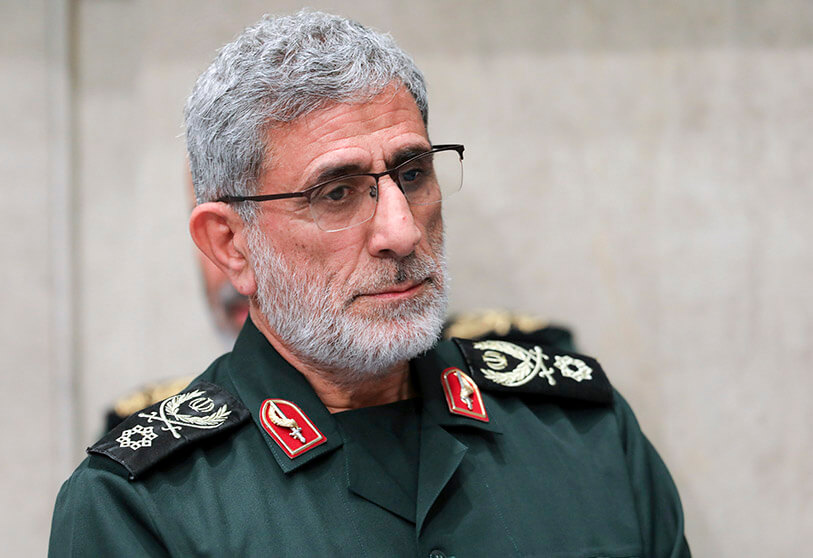June 25, 2021

The Islamic Republic has for all practical purposes abandoned the large militias it once funded in Iraq, but only after skimming off individual fighters who are most loyal to Iran, Reuters has reported.
The militiamen totaled in the tens of thousands, but they were primarily loyal to Iraq rather than Iran, and many fighters in the last two years have turned against Iran as more and more Iraqis see the Islamic Republic as a colonial power trying to run Iraq for its own benefit.
Reuters says Iran has skimmed off only hundreds of militiamen who are now organized in units that are part of Iran’s Qods Force and commanded by Iranian officers.
The change was ordered by Brig. Gen. Esmail Qaani, the deputy commander of the Qods Force who was promoted to its commander after the assassination of Maj. Gen. Qassem Soleymani in January 2020.
The militias faced large-scale criticism in Iraq just months before Soleymani’s assassination as Iraqis balked at militia influence in a string of mass protests against Iranian interference in late 2019.
The militias had already become less useful to Iran since there was no longer any mass military activity. The huge payroll was also an economic drain on Iran.
The new, smaller units are much cheaper and more loyal to Iran. They are also quite capable of carrying out Iran’s attacks on US interests in Iran. They are trained in firing rockets at bases where US troops or contractors are housed. And they regularly launch attacks on convoys carrying supplies to the US forces. Those convoys are handled by Iraqi contractors with exclusively Iraqi staff, so Iran doesn’t have to worry about killing any American citizens and sparking a violent US retaliation. The only people they have killed are Iraqis.
“The new factions are linked directly to the Iranian Pasdaran,” an Iraqi security official told Reuters. “They take their orders from them, not from any Iraqi side.”
One of the pro-Iran commanders of an old militia group said, “The Iranians seem to have formed new groups of individuals chosen with great care to carry out attacks and maintain total secrecy. We don’t know who they are.”
Iraqi security officials said at least 250 fighters had traveled to Lebanon over several months in 2020, where advisors from Iran‘s Pasdaran and Lebanon’s Hezbollah trained them to fly drones, fire rockets, plant bombs and publicize attacks on social media.
“The new groups work in secret and their leaders, who are unknown, answer directly to Pasdar officers,” one of the Iraqi security officials said.
The Iraqi security officials and the Western sources said the new groups were behind attacks including against US-led forces at Iraq’s Ain al-Asad air base in May, Erbil International Airport in April and against Saudi Arabia in January, all using drones laden with explosives. The attacks on Ain al-Asad do threaten Americans as US troops are stationed there, but no Americans have yet been killed there.
Those attacks caused no casualties but impressed Western military officials for their sophistication.
Over the years, Iran has backed many militia groups chiefly Kataib Hezbollah, Kataib Sayyed ash-Shuhada and Asaib Ahl al-Haqq each able to deploy thousands of armed fighters and given quasi-official status by Iraq to help fight the Islamic State.
But after Soleymani’s death, and with protesters turning against groups publicly linked to Iran, officials in Tehran became suspicious of some of the militia groups they had promoted and grew less supportive, according to the militia commanders.
Iran “believed leaks from one of the groups helped cause Soleymani’s death, and they saw divisions over personal interests and power among them,” one told Reuters.
Another said: “Meetings and communications between us and the Iranians have been reduced. We no longer have regular meetings and they’ve stopped inviting us to Iran.”
General Kenneth McKen-zie, head of US Central Command, said in April after the Erbil attack that Iran had made “significant achievements” from its investment in drones.
Last year, previously unknown groups began issuing claims of responsibility following rocket and roadside bomb attacks. Western officials and academic reports often dismissed these new groups as facades for Kataib Hezbollah or another familiar militia. But the Iraqi sources said they are genuinely separate and operate independently.
